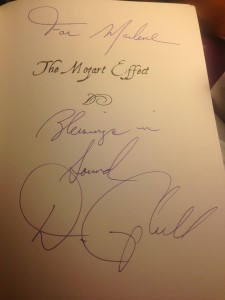The Musician’s Brain
- Marlene
- Blog, flute, Uncategorized
- 3 Comments
The Musician’s Brain
The Musician’s Brain
Science is confirming the “Mozart Effect” through new advances in brain imaging.
When I was a music student (not so very long ago!) nobody knew much about the effect of music on the brain. When The Mozart Effect by Don Campbell was first published in 1997, its thesis was revolutionary. Music could heal the body and make you smarter! I remember buying the book when it first came out in hardcover and sharing it with anyone who would listen. I had the pleasure of meeting Mr. Campbell when he gave a lecture at the University of Colorado when I was in graduate school. Although some of the “music as medicine” parts seem a bit voodoo to me now, I still find it an inspiring book. In fact, I still have the copy that he autographed that day in Boulder. He wrote, “For Marlene- Blessings in Sound, Don Campbell.” It is a blessing, a benediction, a prayer that I carry with me now.
The Mozart Effect‘s greatest achievement may be that it touched off decades of research about music’s effect on the human body. Now, with advances in brain imagery and new understandings about how the brain works, it seems like there’s a new study being published every week linking music and mind.
A recent one that I find interesting is “The Musician’s Brain” from the Journal of Neurobiological Sciences (2012.) In a nutshell, researcher Wichian Sittiprapaporn has made three discoveries:
- Listening to music engages multiple brain regions.
- The brains of musicians are significantly larger than non-musicians.
- Musicians hear and respond to music differently than non-musicians.
Because of the plasticity of the brains of young children, this study would indicate that early music education gives clear advantages in language, mathematics, memory, motor skills, and spatial abilities.
There is, of course, much work to be done in the fields of cognitive science and music psychology. Don Campbell set the wheels in motion. Now it’s up to the fancy brain imaging machines to confirm what we’ve known all along.

3 comments